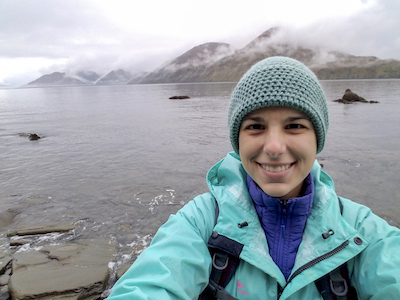Read time:

After graduating Christopher Newport with a BS in biology in 2011, and earning her MS in environmental science in 2014, Ambre Delpopolo’s career took off, starting with her first professional position as a wildlife manager. “After leaving CNU, I worked with a birdstrike control program in Florida,” she explains. “I was at Hurlburt Field [a U.S. Air Force installation]. I worked with a border collie companion to patrol the airfield and prevent collisions between birds and military aircraft.”
After relocating to Atlanta, Delpopolo became a veterinary assistant but longed to return to working hands-on in the field. “While I was grateful for the job, I struggled with a position that didn’t use most of the skills I’d developed in the field of wildlife biology,” she says. “I applied for a job as a North Pacific groundfish observer (NPGO) in Alaska and now work for a company that provides observers for the fishing fleet.” NPGOs are responsible for a wide array of tasks, from comprehensive safety checks of the boats, ensuring fishing activities are in compliance with the law and capturing wildlife specimens to retrieve vital data.
Serving as an NPGO also requires Delpopolo to undergo rigorous training and preparation with little control over assignments or the travel involved. Fortunately, she thrives in these environments. “I am at my best when dealing with chaotic, unpredictable work schedules,” she explains. “During the training, which is five days a week, eight to nine hours per day with homework, tests and laboratory sessions, you learn about the various vessels and objects you’ll be working with. Anything from gear types, safety features, sample design, species ID and immersion suit training is par for the course.”
Now fully immersed in the position, Delpopolo is committed to exemplary work in a highly unpredictable job environment. “It’s really exciting,” she says. “I spent all of my first deployment in Kodiak, Alaska, but then I randomly got called to travel to a completely different location within three hours because a vessel had been picked to have an observer there and I was next in line for an assignment. I know this work isn’t for everyone, but I absolutely love it!”